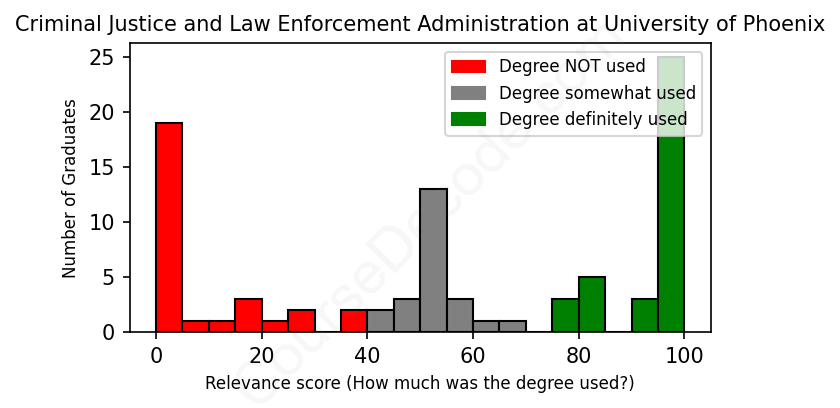
First, some facts. Of the Criminal Justice and Law Enforcement Administration graduates from University of Phoenix we've analyzed , here's how many have used (or NOT used) their degree in their career:

These are estimates based on AI analysis of 88 LinkedIn profiles (see below).
The verdict? Significantly below average. Overall, with an average relevance score of 54%, Criminal Justice and Law Enforcement Administration graduates from University of Phoenix have a much lower likelihood (-13%) of finding work in this field compared to the average graduate across all fields:
And for comparison, here's the chart for all profiles we've looked at across all degrees.
Also, after graduating, 44% of these graduates have pursued further education other than another Bachelor's degree (such as a Masters degree or other), compared to the average across all profiles of 35%. This suggests you may need more than just a Bachelors degree to be competitive as a Criminal Justice and Law Enforcement Administration graduate.
See the details:
|
Relevance score: 54% We think this person has gone into a career only somewhat relevant to their degree. We think this person has gone into a career only somewhat relevant to their degree.
DEGREE INFOGraduated in 2011 from University of Phoenix with a Bachelor of Science - BS in Criminal Justice and Law Enforcement Administration. No other secondary education since. JOB HISTORY SINCE GRADUATIONWarehouse Associate Amazon(BNA3) Aug 2013 - Oct 2014 Technical Team Member  Enovate Medical May 2015 - Aug 2018 Customer Service Representative  Tennessee Quick Cash, Inc Feb 2019 - Apr 2019 Claims Processor  State Farm Apr 2019 - Mar 2022 Human Resources Coordinator  Topre America Corporation Feb 2022 - May 2022 Deputy Court Clerk  General Session Court May 2022 - Present ABOUTTo obtain a position with the opportunity to work in an environment that will challenge me further; while allowing me to contribute to the continued growth and success of the organization |
The top 10 most common jobs done by the graduates we've analyzed (ranked most common to least) are:
After analyzing multiple job profiles of individuals from LinkedIn who have graduated with degrees in Criminal Justice and Law Enforcement Administration from the University of Phoenix, it's evident that the types of jobs they secure vary greatly in terms of relevance to their field of study. Many have ventured into roles that align closely with criminal justice, while others have chosen paths that seem distant from the core principles of law enforcement and justice.
Common job titles among these graduates include law enforcement positions like Police Sergeant, Detective, and Deputy Sheriff, which are directly tied to their degree. Those in such roles typically apply the knowledge and skills learned throughout their studies, engaging daily in law enforcement practices and principles. Additionally, positions like Behavioral Health Therapist and Justice Care Coordinator, while seemingly more focused on mental health or administrative functions, also incorporate aspects of criminal justice, particularly regarding rehabilitation and working with vulnerable populations. These positions illustrate a blending of the fields of law enforcement and social services, reflecting how criminal justice graduates can contribute to society in multifaceted ways.
However, a significant number of graduates occupy roles in unrelated sectors, such as retail management, customer service, or even logistics. These positions often prioritize skills in operations, sales, or administrative tasks rather than the application of criminal justice knowledge. For example, roles like Asset Protection Associate and Finance Advisor do offer occasional links to crime prevention and regulatory understanding, but they don't deeply engage with criminal justice principles. This discrepancy raises questions about the general applicability of their degrees, suggesting that while a criminal justice education provides useful skills, graduates may find themselves in a job market that does not always necessitate this specific training.
In conclusion, while many individuals with degrees in Criminal Justice and Law Enforcement Administration from the University of Phoenix secure relevant positions that utilize their expertise, a noticeable portion ends up in roles that do not fully leverage their degrees. This spectrum highlights the growing versatility—and, at times, the limitations—faced by graduates as they navigate a diverse job market that often prioritizes immediate operational needs over specialized criminal justice knowledge.
Here is a visual representation of the most common words in job titles for Criminal Justice and Law Enforcement Administration graduates (this is across all Criminal Justice and Law Enforcement Administration graduates we've analyzed, not just those who went to University of Phoenix):

When we look at the career trajectories of graduates from the University of Phoenix who studied Criminal Justice and Law Enforcement Administration, a few patterns emerge. Many of these individuals seem to find their footing in various roles related to law enforcement, security, and social services fairly quickly after graduation. For their first jobs post-graduation, many took positions that were somewhat aligned with their studies, like roles in security or behavioral health. For instance, graduates from 2010 took on jobs such as asset protection associates or behavioral change facilitators, indicating an immediate transition into careers relevant to criminal justice, even if not all roles were directly within law enforcement.
As we move five to ten years down the line, it appears that many alumni continue to ascend in their fields, especially those who initially started in more entry-level positions. For example, some graduates from the early 2010s have progressed to roles like Deputy Probation Officer or Chief of Police, showing a notable advancement in their careers. However, it's also clear that not everyone sticks closely to the law enforcement path. A portion of alumni have shifted toward other sectors, including those in administrative roles, real estate, or even entirely different fields like food services or logistics. While a good chunk is employed in roles that remain relevant to their education, some have veered away from their criminal justice roots into unrelated careers.
Overall, it's pretty clear that while many graduates have successfully carved out paths in law enforcement and related fields, there are also several who have not found direct ties to their degree in their career journey. This reflects the diversity of options available after graduation, but for many, there's a strong pull toward roles that utilize their criminal justice education. So, while some have found their niche in significant law enforcement roles, others have branched out into entirely different sectors, highlighting that the connections between their degree and job can vary widely.
Honestly, a Bachelor’s degree in Criminal Justice and Law Enforcement Administration can be pretty manageable, especially if you're already interested in the subject. At places like the University of Phoenix, the coursework is designed to be accessible, with a mix of online classes and practical assignments. So, if you’re dedicated and keep up with your studies, you’ll likely find it’s more about understanding concepts and putting theory into practice rather than facing super tough exams. Overall, I’d say it’s a bit easier than some other degrees that dive deep into complex sciences or math, but like anything, it requires effort and commitment to do well!
Most commonly, in the LinkedIn profiles we've looked at, it takes people 3 years to finish a Bachelor degree in Criminal Justice and Law Enforcement Administration.
Looking at the career paths of these University of Phoenix graduates, it seems like some have definitely landed decent jobs and are likely making a solid income, while others might not be rolling in the dough just yet. For example, roles like "Chief of Police," "Licensed Real Estate Agent," and "Deputy Probation Officer III" usually come with a good paycheck, especially as they advance in their careers. Positions in law enforcement or management tend to pay better, reflecting their responsibilities and the skills required. Plus, going from entry-level jobs to higher roles, like a "Director of Admissions" or a "Global Program Director," suggests a significant bump in pay over time.
On the flip side, some graduates still appear to be struggling with their job choices or haven't advanced much since graduation. Roles like "Breakfast Attendant" or "Sales Associate" likely indicate they might not be earning as much, especially at the start of their careers. You can see a mix of entry-level positions and more established roles, which gives a good idea of the range of salaries among this group. Overall, while some are definitely enjoying rewarding careers financially, others may have to hustle a bit more to reach that level. It just goes to show that the job market can be quite different based on the path you choose and how you climb the ladder!
Here is a visual representation of the most common words seen in the "about" section of LinkedIn profiles who have a Bachelor degree in Criminal Justice and Law Enforcement Administration (this is across all Criminal Justice and Law Enforcement Administration graduates we've analyzed, not just those who went to University of Phoenix). This may or may not be useful:

Here are all colleges offering a Bachelor degree in Criminal Justice and Law Enforcement Administration (ordered by the average relevance score of their Criminal Justice and Law Enforcement Administration graduates, best to worst) where we have analyzed at least 10 of their graduates:
| College | Score | Count |
|---|---|---|
 American Military University American Military University
|
81 | 10 |
 Columbia Southern University Columbia Southern University
|
70 | 16 |
 Western Illinois University Western Illinois University
|
63 | 20 |
 Columbia College Columbia College
|
59 | 10 |
 John Jay College (CUNY) John Jay College (CUNY)
|
57 | 11 |
 University of Phoenix University of Phoenix
|
54 | 88 |
 Florida International University Florida International University
|
53 | 13 |
 Park University Park University
|
53 | 23 |
 Virginia Commonwealth University Virginia Commonwealth University
|
34 | 10 |